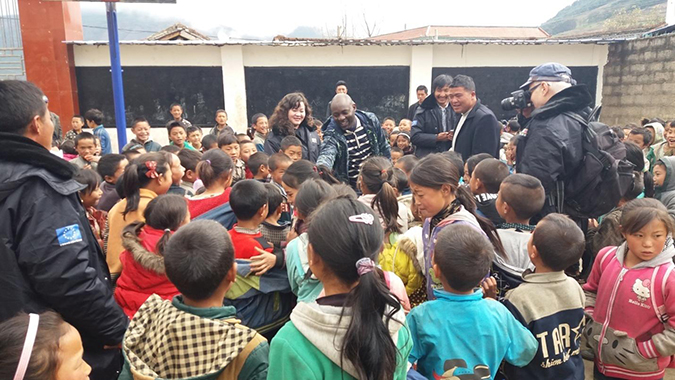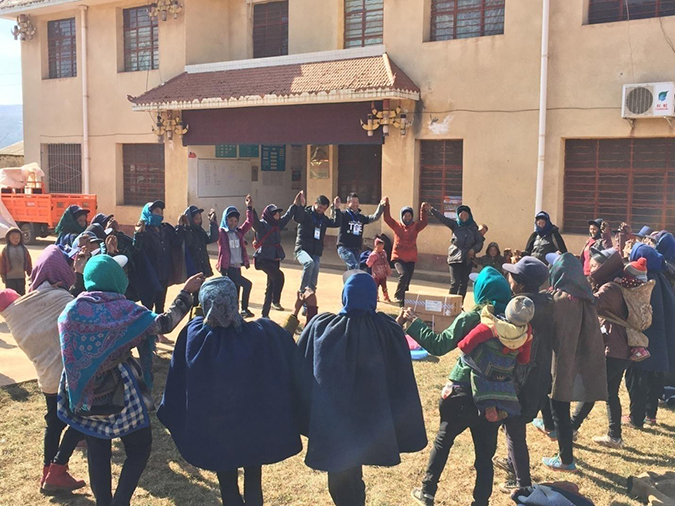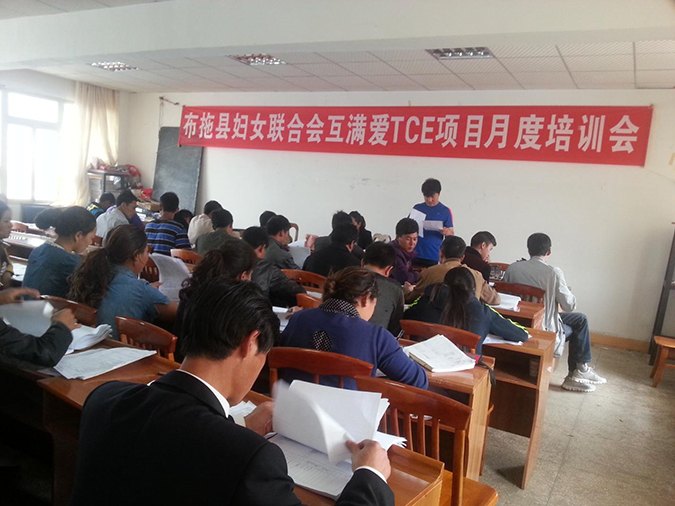Home \ Project News \ Changing the Mindset of the Community
In Butuo County, Luojiaping Township is a village surrounded by mountains and the villagers’ homesteads are scattered around the hillside. Passing through the village it is possible to see that the villagers live an ordinary life. The Field Officer explained that the villagers live quite isolated and do not have much contact with the outside world, except for those who go to the big cities to work. The education level is low and the natural conditions are difficult. HIV/AIDS is an issue in this village due to the people going out as migrant workers. A few women also went to the city as sex workers. When they returned home other villagers were infected and thus the infection spread. Some of the villagers were also involved in drug use where needles where exchanged without knowledge of sterilizing the needles before use, which also caused a rapid spread of HIV. This is not only affecting the grown up population but is also affecting the younger generation.
HIV/AIDS is affecting both young and old, so it is good to reach out to the young with HIV information so that they grow up with an awareness of the epidemic.
The Field Officer explained that during his home visits he experienced that discussing about sex was a sensitive issue thought of as taboo. In the beginning, when the Field Officer started his work of door to door mobilization it was nearly impossible to give any education or disseminate any information about HIV/AIDS. The Yi people maintain their traditional concept of sex that men and women cannot talk about it.
This was encountered by one of the Special Forces when he went for a monitoring and evaluation visit to one of the Field Officers’ field where a training of the villagers had been organized. The Field Officer started his lessons about HIV/AIDS and everyone listened attentively but the moment he started talking about sex related issues and the use of condoms both men and women lowered their heads expressing their shyness. Some men and women quietly left since they believed it was taboo to talk about sex in the presence of elders, children and the opposite sex. Some of them felt embarrassed and they started whispering among themselves ignoring the training from the Field Officer. It was then that the Special Force (Jizi Niuzi) took charge of the situation using his advantage of being able to express himself in the local Yi language and being knowledgeable of the local culture. He explained the nature of TCE (Total Control of the Epidemic) work and its objectives. He explained the situation in Butuo County in relation to HIV/AIDS. The practical examples he gave about HIV/AIDS in the County made the villagers to calm down and to listen attentively. He then proceeded to educate the villagers about HIV/AIDS, the modes of transmission, modes of prevention, HIV testing and other HIV related issues. He explained that the highest mode of transmission was through sex and that it was good to discuss about it openly so that everyone could take a stand on how to avoid being infected. He pointed out to the villagers that because of being shy to openly talk about HIV/AIDS many people were infected. He said if people talked about it openly and everyone got to understand about HIV/AIDS then it could be possible to stop the spread of the disease. He said that controlling the spread of HIV/AIDS lay in the hands of each and every individual within the community regardless of gender or age. 
Spreading the word about HIV/AIDS at any occasion is a must. TCE Field Officers use all the possible methods in reaching out to the populace. 
To raise awareness of HIV/AIDS the project involves the community in different activities where the Field Officers spread the word through singing, dancing, drama etc.
After the presentation from the Special Force the villagers understood the importance of understanding more about HIV/AIDS. They started asking more questions and participating actively in the training.
This training proved that it is important to understand the community and only when one understands and overcomes the barriers of local traditions, can one reach the people and teach them about HIV/AIDS. The more the villagers understand that they must take up the challenge, the more they take a stand to fight and control the spread of the epidemic. From the education and information they received from the TCE Field Officers for the past years the community of Butuo has displayed some signs of change and a better understanding of the effects of HIV/AIDS. Many have now taken a stand to be involved in the fight against the spread of the disease. 
The project management helps the Field Officers to succeed by organizing meetings where challenges in the field are discussed and solutions are sought.
A brief summary of the project:
TCE Butuo is a 3.5 years HIV/AIDS project operating in Butuo County, Liangshan Autonomous Prefecture, Sichuan Province. The idea of the project during the 3.5 years campaign is to achieve total control of the HIV/AIDS epidemic in Butuo County reaching out to a population of 100 000 people. The project does one on one, door to door visits to all villagers reaching out to them with health education, mobilization and voluntary home based counseling and testing. The project furthermore involves a Passionate Network and training of local leaders and influential people who support in information dissemination and mobilization work. Health education provided by the project includes HIV/AIDS knowledge, basic knowledge about STDs (Sexually Transmitted Diseases), mobilizing pregnant women for prenatal care and hospital delivery, providing condoms and explaining condom use to the sexually active singles and couples.

This project is funded by EU and HPP Baltic.
This publication has been produced with the assistance of the European Union. The contents of this publication are the sole responsibility of BTWF TCE Butuo Project and can in no way be taken to reflect the views of the European Union.